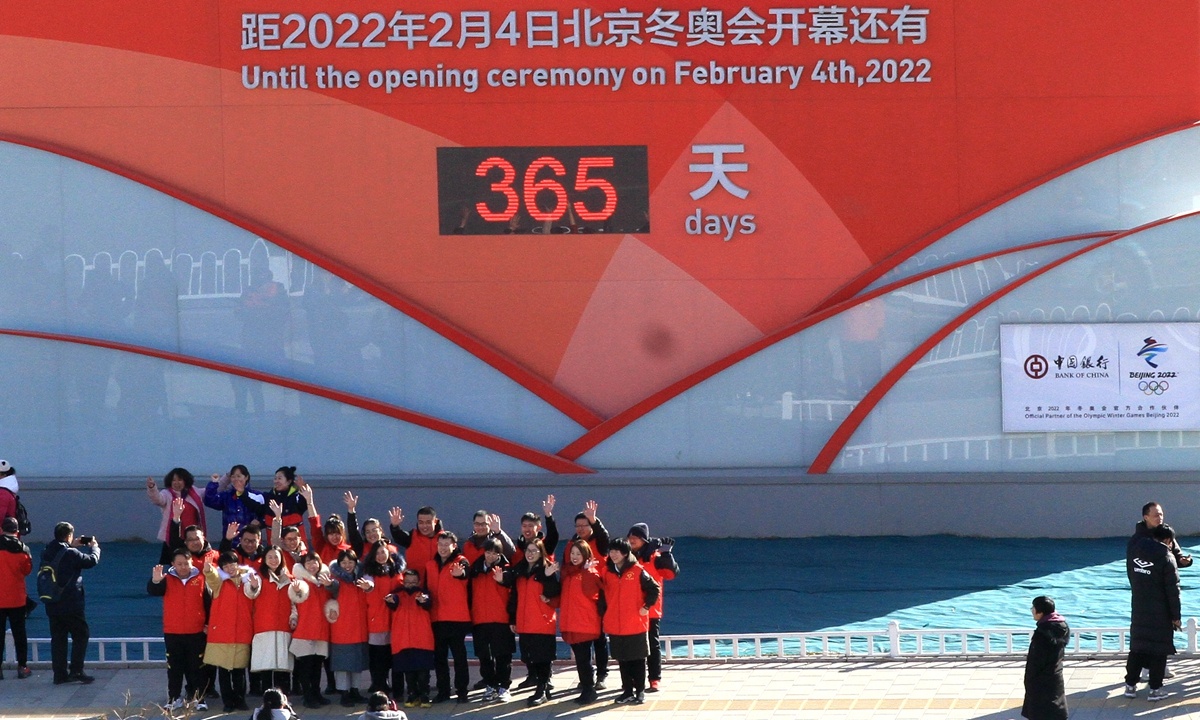
Sports fans, volunteers and the public gather in front of the one-year countdown board of the Beijing 2022 Winter Olympic Games and shout "2022, here we come" in co-host city Zhangjiakou, North China's Hebei Province. (Photo: VCG)
Some so-called human rights groups and politicians are calling for a boycott of the 2022 Winter Olympics in Beijing in the name of Xinjiang affairs and are hoping to push sponsors to declare opposition to the event, but observers noted that such coercion is unlikely to yield results, as major firms will not politicize sports with their own money.
Voice of America on Wednesday reported most members of The Olympic Partners, or TOP, did not respond to calls for a boycott three weeks ago after some "human rights groups", in an open letter, urged the cancellation or change of location of the Winter Olympics over so-called "abuses in Xinjiang." The World Uygur Congress, a US-backed right-wing network, was found to have been involved in the call.
The Canadian Parliament has also called on the International Olympic Committee (IOC) to remove the Olympics from Beijing after passing a non-binding motion on Xinjiang.
Chinese observers noted that using human rights to pressure multinational companies is a customary trick that anti-China groups use to stir up trouble, but they should not overestimate their ability to spread false information and underestimate the public's ability to identify lies.
Song Guoyou, deputy director of the Center for American Studies at Fudan University in Shanghai, told the Global Times on Wednesday that sponsorship is made via the IOC and anti-China groups or individuals cannot mislead the IOC with their unfounded accusations.
For these multinational sponsors, dealing with such kind of coercion was not only a matter about profits and economic interests, but also tested their basic judgment, Song said.
It is very tough to hold major events like the Winter Olympics when the world is still struggling with COVID-19. Using a boycott of the sports event as a "weapon against China" means asking the international sports community to take big losses and pay a price for their political manipulation, Song said.
Other analysts echoed Song's view, noting that major firms are unlikely to give up this opportunity for branding and making profit just because of some unfounded, politically driven accusations.
Despite many of the human rights groups having a US background and noises from American and Canadian politicians, governments around the world have been cold to the boycott calls.
Li Haidong, a professor at the Institute of International Relations of the China Foreign Affairs University, said on Wednesday that politicians seek personal interests and political capital but governments have to consider national interests.
Some clown-like figures stir up troubles and watch reactions and many groups do have US background. Their aim is to initiate media campaign to slander China. But governments have so far chosen to refrain because they knew an irrational boycott will frustrate their own athletes, hurt their own companies and put diplomatic relations at risk, Li said.
"A rational administration should not be hijacked by radical voices," Li noted.
In 2008, noises ran through the Beijing Summer Olympics and disgusting things happened during the torch relay. But they did not hinder China from hosting a successful sports event, nor will they this time, Li said.


